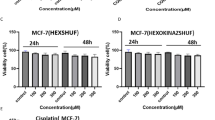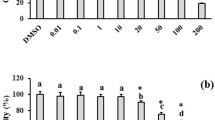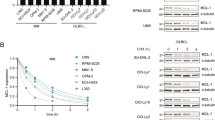Abstract
Aim:
To investigate whether myosin light chain kinase (MLCK) contributed to the high proliferative ability of breast cancer cells.
Methods:
Soft agar colony formation on the MCF-7 and LM-MCF-7 cell lines was determined. The cell cycles of MCF-7 and LM-MCF-7 were detected using flow cytometry analysis. Western blot analysis was performed to detect the expression levels of p-ERK1/2, total-ERK1/2, p-p38, total p38, p-JNK, total-JNK, survivin, Bcl-2, p-MLC, caspase-9, cleaved caspase-9, and MLCK. After treatment with adriamycin (ADR), ML-7 and SB203580, apoptosis was examined using flow cytometry analysis and Annexin V-FITC fluorescence microscopy.
Results:
The breast cancer LM-MCF-7 cell line with high metastasis potential (a metastitic sub-clone of MCF-7) had higher anti-apoptosis ability relative to MCF-7 cells in response to adriamycin treatment (apoptosis rate: 6.76% vs 28.58%, P<0.05). Moreover, the expression level of MLCK was upregulated and the level of phosphorylated p38 (p-p38) was decreased in LM-MCF-7 cells. Flow cytometry analysis showed that ML-7, selective inhibitor of MLCK, could induce apoptosis of the LM-MCF-7 cells, in which the level of p-p38 was increased. Meanwhile, the expression levels of Bcl-2 and survivin were downregulated, while the caspase-9 was upregulated suggesting that the cells were undergone apoptosis. Flow cytometry analysis showed that SB203580, an inhibitor of p38, abolished ML-7-induced apoptosis, which resulted in the upregualtion of Bcl-2 and survivin, and downregulation of caspase-9, suggesting that Bcl-2, survivin and caspase-9 are downstream effectors of p38.
Conclusion:
MLCK is responsible for high proliferative ability of breast cancer cells through anti-apoptosis, in which p38 pathway was involved.
Similar content being viewed by others
Log in or create a free account to read this content
Gain free access to this article, as well as selected content from this journal and more on nature.com
or
Abbreviations
- MLCK:
-
myosin light chain kinase
- p-MLC:
-
phosphorylated myosin light chain
- MAPK:
-
mitogen-activated protein kinase
- ERK:
-
extracellular signal-regulated kinase
- p-p38:
-
phosphorylated p38
- ADR:
-
adriamycin
- SCID:
-
severe combined immunodeficiency
References
Connell LE, Helfman DM . Myosin light chain kinase plays a role in the regulation of epithelial cell survival. J Cell Sci 2006; 119: 2269–81.
Petrache I, Crow MT, Neuss M, Garcia JG . Central involvement of Rho family GTPases in TNF-alpha-mediated bovine pulmonary endothelial cell apoptosis. Biochem Biophys Res Commun 2003; 306: 244–9.
Petrache I, Verin AD, Crow MT, Birukova A, Liu F, Garcia JG . Differential effect of MLC kinase in TNF-alpha-induced endothelial cell apoptosis and barrier dysfunction. Am J Physiol Lung Cell Mol Physiol 2001; 280: L1168–78.
Petrache I, Birukov K, Zaiman AL, Crow MT, Deng H, Wadgaonkar R, et al. Caspase-dependent cleavage of myosin light chain kinase (MLCK) is involved in TNF-alpha-mediated bovine pulmonary endothelial cell apoptosis. FASEB J 2003; 17: 407–16.
Wadgaonkar R, Linz-McGillem L, Zaiman AL, Garcia JG . Endothelial cell myosin light chain kinase (MLCK) regulates TNFalpha-induced NFkappaB activity. J Cell Biochem 2005; 94: 351–64.
Gu LZ, Hu WY, Antic N, Mehta R, Turner JR, de Lanerolle P . Inhibiting myosin light chain kinase retards the growth of mammary and prostate cancer cells. Eur J Cancer 2006; 42: 948–57.
Fazal F, Gu L, Ihnatovych I, Han Y, Hu W, Antic N, et al. Inhibiting myosin light chain kinase induces apoptosis in vitro and in vivo. Mol Cell Biol 2005; 25: 6259–66.
Diecke FP, Wen Q, Iserovich P, Li J, Kuang K, Fischbarg J . Regulation of Na-K-2Cl cotransport in cultured bovine corneal endothelial cells. Exp Eye Res 2005; 80: 777–85.
Korzeniewska-Dyl I . Caspases--structure and function. Pol Merkur Lekarski 2007; 23: 403–7.
Mehlen P, Puisieux A . Metastasis: a question of life or death. Nat Rev Cancer 2006; 6: 449–58.
Schultz DR, Harrington WJ Jr . Apoptosis: programmed cell death at a molecular level. Semin Arthritis Rheum 2003; 32: 345–69.
Maruyama J, Naguro I, Takeda K, Ichijo H . Stress-activated MAP kinase cascades in cellular senescence. Curr Med Chem 2009; 16: 1229–35.
Rincon M, Davis RJ . Regulation of the immune response by stress-activated protein kinases. Immunol Rev 2009; 228: 212–24.
Werlen G, Hausmann B, Naeher D, Palmer E . Signaling life and death in the thymus: timing is everything. Science 2003; 299: 1859–63.
Wada T, Penninger JM . Mitogen-activated protein kinases in apoptosis regulation. Oncogene 2004; 23: 2838–49.
Dent P, Yacoub A, Fisher PB, Hagan MP, Grant S . MAPK pathways in radiation responses. Oncogene 2003; 22: 5885–96.
Hommes DW, Peppelenbosch MP, van Deventer SJ . Mitogen activated protein (MAP) kinase signal transduction pathways and novel anti-inflammatory targets. Gut 2003; 52: 144–51.
You J, Mi D, Zhou X, Qiao L, Zhang H, Zhang X, et al. A positive feedback between activated extracellularly regulated kinase and cyclooxygenase/lipoxygenase maintains proliferation and migration of breast cancer cells. Endocrinology 2009; 150: 1607–17.
Wang FZ, Sha L, Zhang WY, Wu LY, Qiao L, Li N, et al. Involvement of hepatitis B X-interacting protein (HBXIP) in proliferation regulation of cells. Acta Pharmacol Sin 2007; 28: 431–8.
Qiao L, Zhao TJ, Wang FZ, Shan CL, Ye LH, Zhang XD . NF-kappaB downregulation may be involved the depression of tumor cell proliferation mediated by human mesenchymal stem cells. Acta Pharmacol Sin 2008; 29: 333–40.
Zhou XL, Qin XR, Zhang XD, Ye LH . Downregulation of Dickkopf-1 is responsible for high proliferation of breast cancer cells via losing control of Wnt/beta-catenin signaling. Acta Pharmacol Sin 2010; 31: 202–10.
Zhou X, Liu Y, You J, Zhang H, Zhang X, Ye L . Myosin light-chain kinase contributes to the proliferation and migration of breast cancer cells through cross-talk with activated ERK1/2. Cancer Lett 2008; 270: 312–27.
Beresford MJ, Wilson GD, Makris A . Measuring proliferation in breast cancer: practicalities and applications. Breast Cancer Res 2006; 8: 216.
Anand S, Penrhyn-Lowe S, Venkitaraman AR . AURORA-A amplification overrides the mitotic spindle assembly checkpoint, inducing resistance to Taxol. Cancer Cell 2003; 3: 51–62.
Eferl R, Wagner EF . AP-1: a double-edged sword in tumorigenesis. Nat Rev Cancer 2003; 3: 859–68.
Hermeking H . The 14-3-3 cancer connection. Nat Rev Cancer 2003; 3: 931–43.
Ye LH, Wu LY, Guo W, Ma HT, Zhang XD . Screening of a sub-clone of human breast cancer cells with high metastasis potential. Zhonghua Yi Xue Za Zhi 2006; 86: 61–5.
Zhao Y, Chen X, Cai L, Yang Y, Sui G, Wu J . Angiotensin II suppresses adriamycin-induced apoptosis through activation of phosphatidylinositol 3-kinase/Akt signaling in human breast cancer cells. Acta Biochim Biophys Sin 2008; 40: 304–10.
Tsuchiya T, Tsuno NH, Asakage M, Yamada J, Yoneyama S, Okaji Y, et al. Apoptosis induction by p38 MAPK inhibitor in human colon cancer cells. Hepatogastroenterology 2008; 55: 930–5.
Makin G, Dive C . Modulating sensitivity to drug-induced apoptosis: the future for chemotherapy? Breast Cancer Res 2001; 3: 150–3.
Iyoda K, Sasaki Y, Horimoto M, Toyama T, Yakushijin T, Sakakibara M, et al. Involvement of the p38 mitogen-activated protein kinase cascade in hepatocellular carcinoma. Cancer 2003; 97: 3017–26.
Acknowledgements
This work was supported from National Basic Research Program of China (973 Program, No 2007CB914804, No 2007CB914802, No 2009CB521702) and National Natural Scientific Foundation of China (No 30770826).
Author information
Authors and Affiliations
Corresponding authors
Rights and permissions
About this article
Cite this article
Cui, Wj., Liu, Y., Zhou, Xl. et al. Myosin light chain kinase is responsible for high proliferative ability of breast cancer cells via anti-apoptosis involving p38 pathway. Acta Pharmacol Sin 31, 725–732 (2010). https://doi.org/10.1038/aps.2010.56
Received:
Accepted:
Published:
Issue date:
DOI: https://doi.org/10.1038/aps.2010.56
Keywords
This article is cited by
-
MYLK4 promotes tumor progression through the activation of epidermal growth factor receptor signaling in osteosarcoma
Journal of Experimental & Clinical Cancer Research (2021)
-
Growth, lifetime, directional movement and myosin-dependent motility of mutant keratin granules in cultured cells
Scientific Reports (2021)
-
MYLK promotes hepatocellular carcinoma progression through regulating cytoskeleton to enhance epithelial–mesenchymal transition
Clinical and Experimental Medicine (2018)
-
Characterization of the Transcriptional Complexity of the Receptive and Pre-receptive Endometria of Dairy Goats
Scientific Reports (2015)
-
Fullerene (C60) nanoparticles exert photocytotoxicity through modulation of reactive oxygen species and p38 mitogen-activated protein kinase activation in the MCF-7 cancer cell line
Journal of Nanoparticle Research (2013)



